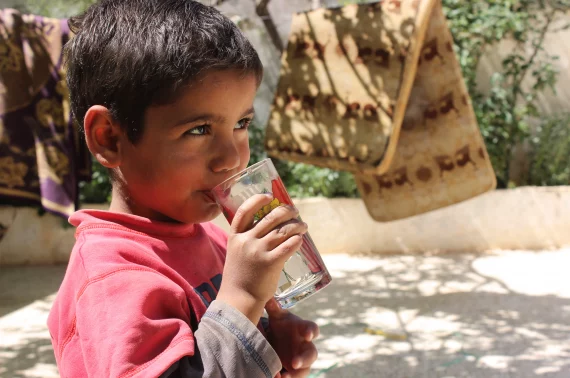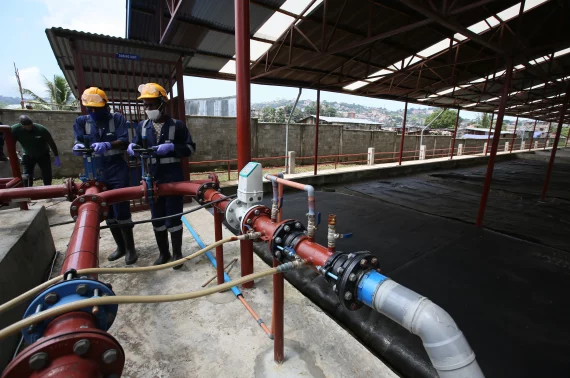 Blogs
Blogs
February 1, 2022 • 5 min read
by Mary Van Lieshout, Deputy CEO, GOAL
In 2022, 811 million people worldwide, more than 1 in 10 people globally, will go to bed hungry every night. 785 million people still lack access to basic drinking water. The World Health Organisation estimates that 673 million people are forced to practice open defecation worldwide. In the 21st century these figures are alarming. Behind each figure are communities and families fighting desperately to survive. While a new year brings hope and opportunity the international community must do better.
While we have seen positive changes in international development practices in recent decades, change has been gradual. Aid has shifted towards development. Climate change, conflict and crises still leave millions reliant on emergency aid, but the focus has moved towards creating long lasting change to lift communities out of poverty. While millions have enjoyed new opportunities of work, access to health care and education, too many communities in rural Africa remain entrenched in extreme poverty, while conflict, and consequent displacement is on the rise.
GOAL’s Approach
In GOAL we’ve found that working with local actors, including local governments, local private sector agencies and local Community Based Organisations is key to success. But there’s more to it. Last year Harvard University reviewed our approach to identify the foundations of our long-term effectiveness in Northwest Syria where we are now moving to support local communities in income generation. Informed by four decades of humanitarian and emergency response, GOAL has adopted and promotes four core approaches towards building lasting change in fragile and conflict affected communities: these approaches include working to support local systems to become inclusive and resilient, adaptive management, working with local actors and accountability.
A systems approach promotes a holistic response and delivers long terms solutions. In Northwest Syria GOAL teams are working to rehabilitate and stabilise public water supply stations. Improving this system sustainably has brought consistent running water to over 800,000 people. No longer dependent on trucks to deliver water, local families can continue, in the midst of conflict, to access safe, clean, drinking water at the turn of a tap.

Restoring water systems in Northwest Syria has provided thousands of homes with safe, clean drinking water.
Through continuous risk analysis and contingency planning, humanitarian support needs to adapt to regional, national and global challenges. The unforeseen onset of Covid-19 pandemic has forced organisations to rethink and reimagine their programmes. The congregation of large crowds awaiting traditional food and medical supplies has long posed a security risk in conflict zones such as Syria. In a world fighting the spread of Covid-19 it now poses a public health risk. Voucher assistance has played an important role in bridging the gap. Impacted families have been empowered to source their own groceries, fuel and other essentials – items which may otherwise would be out of reach due to the economic and employment impacts of Covid-19. This flexible form of relief can be an effective, timely lifeline for vulnerable families.
Empowering communities
Putting relief and recovery into the hands of local communities, statutory authorities, private sector partners and local NGOs is key to improving the sustainability of humanitarian aid and development programmes. Beyond our work in Syria, GOAL has worked with the local authority in Sierra Leone to create the country’s first wastewater treatment plant. Working with Freetown City Council and private sector partners has proven successful, with 60% of the city’s solid and liquid waste to be safely removed from households and businesses in 2022. Prior to the construction of the plant, over 90% of the city’s waste was managed by informal means, posing health risks to many. Once fully operational GOAL will step back and leave it in the hands of local actors – an ultimate aim of all humanitarian interventions.
Finally, adopting a robust assurance framework provides a method of accountability and builds trust between humanitarian actors and fragile communities. GOAL’s assurance framework consists of minimum standards for staff and independent quality-control mechanisms to track accountability and ensure programme participants are safe and protected from harm. Complaints response and whistleblowing mechanisms are also integrated into GOAL’s programmes, allowing community members to alert the organisation directly or through a third party hotline if programming is not in line with quality and safety standards. Creating that feedback loop and giving a strong voice to the communities we serve is essential in building that trust, often a significant barrier to progress.

GOAL supported wastewater treatment facility in Freetown, Sierra Leone.
Pushing Boundaries
In the words of former Irish President Mary McAleese “we are a vibrant first world country but we have a humbling third world memory.” Our memory feeds our empathy and desire to help those in need. Ireland’s history providing aid worldwide is rich, our experience based on evidence and practice is wide and our voice at international level is respected. Ireland’s presence on the UN Security Council presents us with a new opportunity to speak up for the rights of the world’s most vulnerable communities on the global stage.
If we are truly going to see a shift in the extreme poverty we need to push traditional boundaries and do aid differently. Resilience, sustainability and empowerment must be front and centre to our mission. The communities we serve must regain the place that is rightfully theirs – as central actors with whom we collaborate and share skills, and ready ourselves for departure. As humanitarian actors we must strive to no longer be needed. The systems we leave behind should be resilient and inclusive. This will only happen when we ensure people in need have what inequality and misfortune have deprived them of: the means and tools to fight poverty in dignity and power. I believe that when we do that, we will see the lasting change they deserve.
